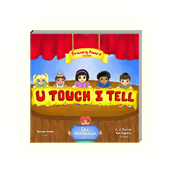


Healing the past, shielding the present and saving the future . . . One life at a time.

Get the Book

U Touch I Tell
TM

Join
Our
List
Our
List


Childhood Sexual Abuse | Protecting The Children | Child Abuse Non-Profit Organizations | Child Abuse
Prevention | How To Stop Child Abuse | Sexual Predators | Sexual Abuse Books | Help Sexual Abuse
Victims | Preventing Child Molestation | Incest Prevention

Resources & Facts
U Touch I Tell(TM) - Non-Profit Organizations -
Protecting Child Sexual Abuse Victims
What's on this Page
If you thought no one would believe you if you told, and you knew that your offender would be extremely angry at
you, or threatening harsh punishment, would you have the courage to tell?
What if your offender told you that you would go to jail because you were just as guilty as he or she is? Often
victims fail to report in fear that the disclosure will bring consequences that are worse than being victimized again.
The child who tells is incredibly brave and very rare. It is important to remain calm and listen to the childís story. Let
the child know that you believe and support them.
Below are some excellent resources and facts about several topics related to inappropriate touching. I found them
extremely helpful, and I hope you do too.
Childhood is precious, innocent. Once sexual abuse occurs. . . childhood has been forever robbed!!
My best always,
Chi
.
1. The first thing you must tell your kids about is the fact that it is never alright for anybody to touch their private
parts, or simply put, those parts which are covered in their bathing suits.
Read more at www.howtotalktoyourkidsabout.org/age/6to7/how-to-talk-to-kids-about-inappropriate-touching.html
************************************************************************************************************************
.
Before You Talk to Your Child. . .
.
Before you talk with your child, it's important that you understand just what "inappropriate touching" means and
are comfortable speaking about it. Quite often, the subject of sexual abuse can make parents immediately
think, "It's too awful to think about," or "That would never happen in our neighborhood/family/school."
The truth is, . . . Read more at www.scanva.org/prc-inappropriate-touching.htm
op <l >
************************************************************************************************************************
.
RAINN: The nation's largest anti-sexual violence organization.
One of "America's 100 Best Charities" -Worth magazine
.
Have the Conversation - NOW!
Parents are surrounded by messages about child sexual abuse. Talkshows and TV news warn parents about
dangers on the Internet, at school and at home. However, parents donít get much advice on how to talk to their
children if they are concerned that sexual abuse is occurring.
.
Talk to Your Child Directly
Teach them that some body parts are private
.(Learn more on how to talk to your child)
.www.rainn.org/get-information/types-of-sexual-assault/child-sexual-abuse/if-you-suspect
.
.
Question for Mommy MD:
.Should we fear other children molesting children of the same age range?
What signs should we look for curious kids or actual kids who are causing harm?
.Read more at www.medrounds.org/guide-to-realistic-parenting/2007/01/child-sexual-abuse.html
.Top <l >
.
How To Teach The Underwear Rule
The "underwear rule" was developed to help parents and caregivers start a discussion with their children. It can
be a highly effective tool against sexual abuse.
Read more at www.underwearrule.org/howto_en.asp
************************************************************************************************************************
.The Best Prevention - Supervise Your Children
.Itís not likely to occur in my lifetime, but there are a few things we can all do to reduce the occurance of
childhood trauma, and contribute to the happy goal of putting folks like me out of business.
Read more at www.seattletherapist.wordpress.com/tag/childhood-sexual-abuse/
..
Parents: Get Involved!
.
Research tells us that children are most often victimized by family members, substitute caregivers, or trusted
adults who function "normally" in society.
.
The child of five or older who knows and cares for the abuser becomes trapped between affection or loyalty for
the person, and the sense that the sexual activities are terribly wrong. If the child tries to break away from the
sexual relationship, the abuser may threaten the child with violence or loss of love. When sexual abuse occurs
within the family, the child may fear the anger, jealousy or shame of other family members, or be afraid the
family will break up if the secret is told.
Research also supports the effectiveness of parental involvement in personal safety education. Several studies
have shown that parents, when provided with developmentally appropriate materials for their children and
instruction and support from schools, can be very effective instructors of personal safety (Burgess and Wurtele,
1998; Wurtele, 1993; Wurtele, Currier, Gillispie, and Franklin, 1991, 1992; Wurtele, Kast, and Melzer, 1992).
..Top <l >
Parents can prevent or lessen the chance of sexual abuse by:
Telling children that if someone tries to touch your body and do things that make you feel funny, say NO
to that person and tell me right away
Teaching children that respect does not mean blind obedience to adults and to authority, for example,
don't tell children to always do everything the teacher or baby-sitter tells you to do
Encouraging professional prevention programs in the local school system
Understanding that the average victim of child abuse is between 8 and 11 years old. Some experts
suggest that the most vulnerable child is between the ages of 6 and 10, and living in a two-parent home.
Some experts estimate that 5 or 6 children in a typical classroom of thirty have been affected by sexual
abuse, regardless of geographic area, race, or socioeconomic class.
Knowing that approximately 90% of offenders are known to the children. In addition, a child is 3 times
more likely to be molested by a recognized, trusted adult than by a stranger. 50% of child victims are
molested in their own homes or in the offenderís home.
.
Offenders are not usually strangers to children. According to the National Clearinghouse, approximately 90% of
offenders are known to the children. In addition, a child is 3 times more likely to be molested by a recognized,
trusted adult than by a stranger. 50% of child victims are molested in their own homes or in the offenderís home.
.
Call your local Child Protective Services Unit at the Department of Social Services to report the incident.
.









©2012 U Touch I Tell(TM)





